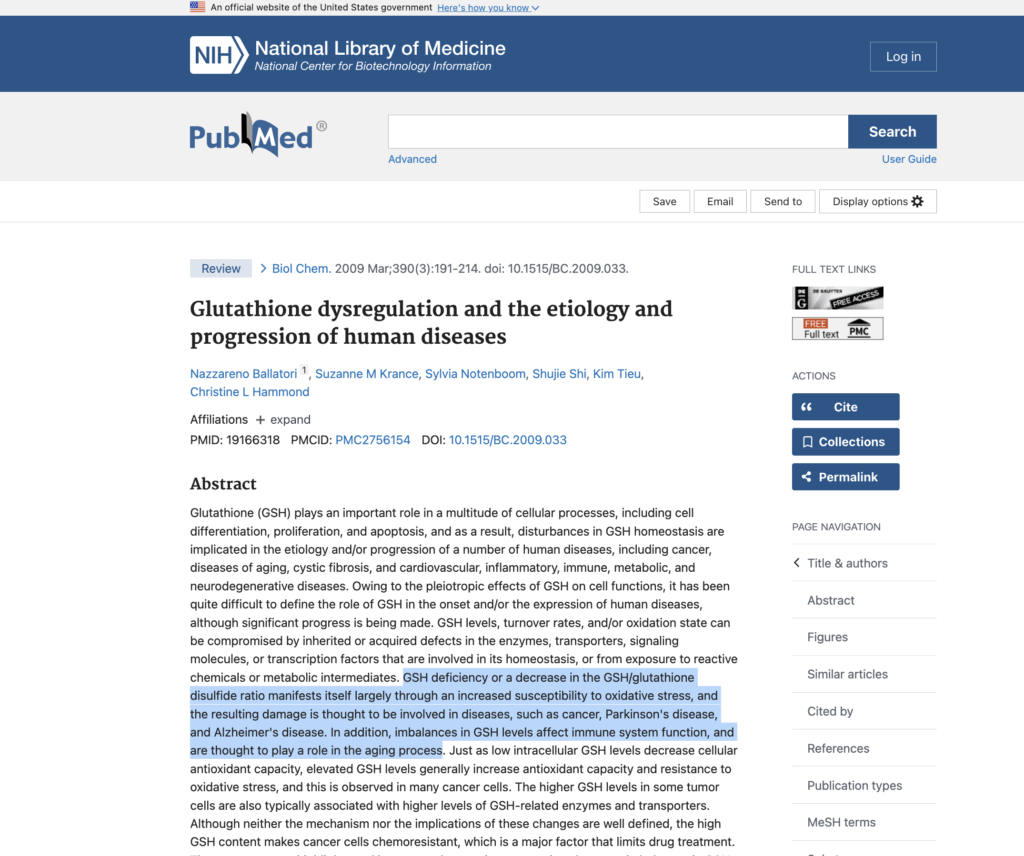Glutathione dysregulation and the etiology and progression of human diseases
Source: https://pubmed.ncbi.nlm.nih.gov/19166318/

🔍 What the study says (PMID 19166318)
- Glutathione is a vital antioxidant made inside your cells, involved in detoxification, immune support, cell growth, and programmed cell death.
A disturbance of glutathione balance, or low GSH, is linked to many chronic conditions—like cancer, neurodegenerative disorders, cardiovascular, metabolic, inflammatory, and immune diseases, and aging-related problems. Wikipedia+13PMC+13PubMed+13 - When GSH levels drop or the GSH:GSSG (oxidized form) ratio falls, cells become more vulnerable to oxidative stress—damage caused by harmful reactive oxygen or nitrogen molecules. This stress is believed to be a major factor in conditions like Parkinson’s, Alzheimer’s, and cancer. PMC
Why do our glutathione levels decline over time?
Here are the main everyday factors that reduce GSH:
- Oxidative Stress + Toxin Exposure
Activities like exercise, metabolism, exposure to pollutants, chemicals or heavy metals cause GSH to be used up as it neutralizes damaging free radicals. Annex Naturopathic Clinic+11Wikipedia+11PubMed+11PLOS+4Healthline+4optimaldx.com+4 - Aging
As we get older, our ability to make GSH decreases, and the enzymes that recycle its oxidized form (GSSG) become less effective. This leads to steady depletion. WikipediaAging-US - Poor Nutrition or Lack of Building Blocks
Glutathione is made from three amino acids—cysteine, glutamate, and glycine. If you lack one (especially cysteine), your body struggles to produce enough new GSH. optimaldx.comWikipedia - Genetic or Acquired Enzyme Defects
Some people have inherited variations or dysfunctions in enzymes or transporters needed for GSH production and recycling which impair their glutathione balance. PMC+2PubMed+2
What happens if glutathione stays low?
When GSH stays depleted:
- Oxidative stress escalates, damaging DNA, proteins, and mitochondria (our cell’s energy factories).
- Immune system efficiency drops, increasing vulnerability to infections and inflammation.
- Cell function and repair decline, accelerating tissue aging and dysfunction. MDPI+5PMC+5MDPI+5Annex Naturopathic Clinic+2Pharmacist.com+2optimaldx.com
This chronic oxidative damage is strongly associated with diseases like heart disease, diabetes, Alzheimer’s, Parkinson’s, cancer—and speeds up functional decline that we often label as “aging.” PMCoptimaldx.comMDPI
✅ In plain simple terms
- Every day, your cells use up GSH to fight off internal and environmental threats.
- With aging, worse nutrition, and more toxic exposure, your body starts losing the ability to remake glutathione fast enough.
- That means less protection, more cellular damage, and an increased risk of chronic illness and early aging.